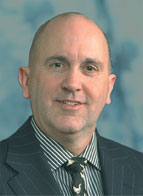Chaddock heads AVMA Washington office
Dr. Michael Chaddock has accepted the post of director of the AVMA Governmental Relations Division in Washington, D.C., effective Jan. 2. AVMA Executive Vice President Bruce W. Little announced the appointment in late December. Dr. Chaddock replaces Dr. Niall B. Finnegan, who retired as director last June. The former Michigan state veterinarian and 2001-2002 AVMF/AVMA Congressional Science Fellow brings an interest in public policy and years of experience working in legislative arenas. "My diverse background is the strength that I bring to the job," Dr. Chaddock said. A 1973 graduate of Michigan State University, Dr. Chaddock has had several careers within the veterinary profession, including private practice as an employee and owner. He has been a technical service veterinarian working for an international company representing areas of nutrition, health, economics, and livestock management, with an emphasis on problem solving and disease prevention.
As an AVMF/AVMA Congressional Science Fellow, Dr. Chaddock served on the staff of Louisiana Sen. Mary Landrieu. He worked on several issues for the senator, including biologic and chemical terrorism, agroterrorism, animal care and welfare, and animal agriculture. Senator Landrieu chose Dr. Chaddock to head efforts to develop a Center of Excellence in Biological and Chemical Warfare Medicine in Louisiana. Dr. Chaddock has also worked in the academic field as an adjunct professor at the Michigan State University College of Veterinary Medicine and later at Virginia-Maryland Regional College of Veterinary Medicine. His appointments in organized veterinary medicine have included chairing the AVMA PAC Policy Board, serving as Michigan's delegate to the AVMA House of Delegates, and representing state and federal government salaried veterinarians on the House Advisory Committee. Dr. Chaddock recalls how several years ago he took a monthlong sabbatical from his job with the Michigan Department of Agriculture to spend time in the AVMA Governmental Relations Division office. "That enlightened me to what the AVMA's mission was here in Washington, and I certainly developed an interest," he said. As GRD director, Dr. Chaddock sees his role as helping to carry out the policy agenda set by the AVMA Executive Board. "I think it's very important that we here at the GRD are carrying out the will of the profession through the Executive Board," he said. In addition to continuing to monitor animal welfare issues, Dr. Chaddock said the AVMA's legislative priorities in the 108th Congress are reintroduction of the Minor Use and Minor Species Animal Health Act, Small Business Health Fairness Act, and Veterinary Health Enhancement Act. Those bills would, respectively, increase the availability of drugs to minor species, offer health insurance to association members and their employees in all the states, and provide for scholarships or debt assistance to veterinarians willing to work after graduation in rural or inner-city areas where veterinary services are scarce. | |||

 Most recently, Dr. Chaddock was a senior fellow at Johns Hopkins Center for Civilian Biodefense Strategies. There, he was a liaison between the center and state public health departments, collecting and analyzing data regarding preparedness activities for bioterrorism planning. Dr. Chaddock was also responsible for reviewing agroterrorism preparedness, prevention, and response plans for the country's food supply.
Most recently, Dr. Chaddock was a senior fellow at Johns Hopkins Center for Civilian Biodefense Strategies. There, he was a liaison between the center and state public health departments, collecting and analyzing data regarding preparedness activities for bioterrorism planning. Dr. Chaddock was also responsible for reviewing agroterrorism preparedness, prevention, and response plans for the country's food supply.